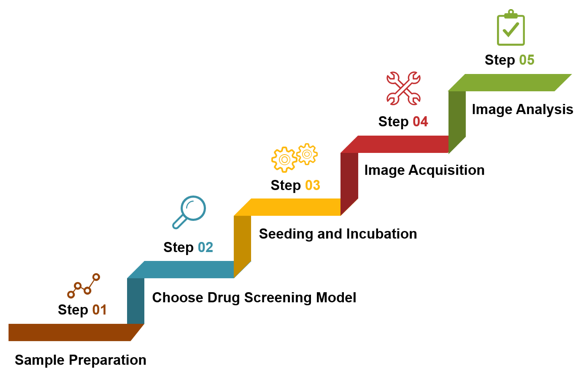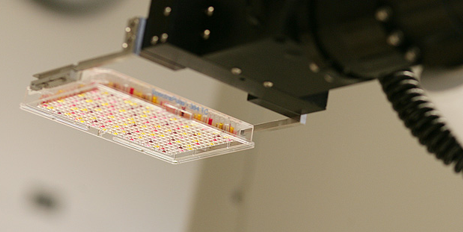High content screening (HCS), also known as automated microscope-based screening, measures the biological activity of a single cell or a whole organism after treatment with thousands of agents in a multi-well plate. Typically, the cell or organism are characterized by one or more fluorescent dyes, which leads to the term "high content".
Cell-based HCS has rapidly gained attention, as it is being used in almost all of the preclinical steps of the drug discovery process. HCS is an analysis tool used to acquire, manage, and search multi-parametric information about the composite phenotype of cells. It allows simultaneous analysis of the impact of a given disturbance (gene modification or exposure to a drug) on such composite phenotypes. For these reasons, HCS is used to support the hit-to-lead processes and mode-of-action studies in secondary and tertiary screening procedures, but it can also be used as a tool for primary screening, in which thousands of compounds may be identified.
Creative Bioarray offers expertise and services in assay development, screening, and data analysis for HCS, where the readout is based on images obtained using high-throughput microscopy systems. Our team has expertise in all areas of high content image-based screening including sample preparation, image acquisition, image analysis, image data management, and algorithm development.
 Figure 1. Key steps of our high content screening services.
Figure 1. Key steps of our high content screening services.
Custom High Content Screening Assays
Our HCS platform has extensive experience in phenotypic assays, ranging from functional assays, such as inhibition of phagocytosis and quantification of cytoskeletal changes, to transcriptional reporter modulation, such as activation of insulin promoter activity. With over 100 HCS assays to choose from, we are able to customize any test to meet the exacting needs of our clients.
|
|
|
|
|
|
|
|
|
|
|
|
|
|
|
|
|
|
|
|
|
|
Key Features of Our High Content Screening Services
- More than 200 primary and stem cell-based HCS assays, many of which can be adapted or customized to answer specific biological questions
- Collaborative approach to assay development and data analysis
- Specialize in custom assays using advanced models including iPS-derived cells
- Focus on high quality data and biological relevance

As we expand our capabilities in combining high content analysis with high throughput screening, we are moving from traditional target-centric biochemical assays to phenotypic and genomic approaches to dynamically study disease targets and identify new ways to design and develop therapeutic molecules.
Creative Bioarray's HCS also allows investigation of the compound's action on a larger number of known targets, as well as detection of the compound's side effects in order to continue development selectively, and only those with high probability being successfully developed into drugs.
- Phosphatase Screening Services
- Phosphodiesterase Screening Services
- Poly (ADP-ribose) Polymerase (PARP) Screening Services
- GPCR Screening Services
- Kinase Screening Services
- Transporter Screening Services
- Ion Channel Screening Services
- HSP90 Screening Services
- Nuclear Receptor Screening Services
- Protease Screening Services
- Ubiquitin Screening Services
- High Throughput Screening Services
- Target-based Screening Services
- Phenotypic Screening Services
- Apoptosis Screening
- Epigenetics Screening Services